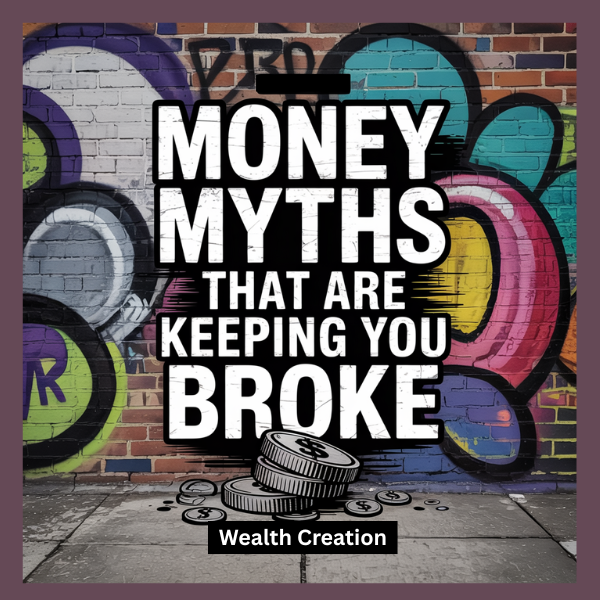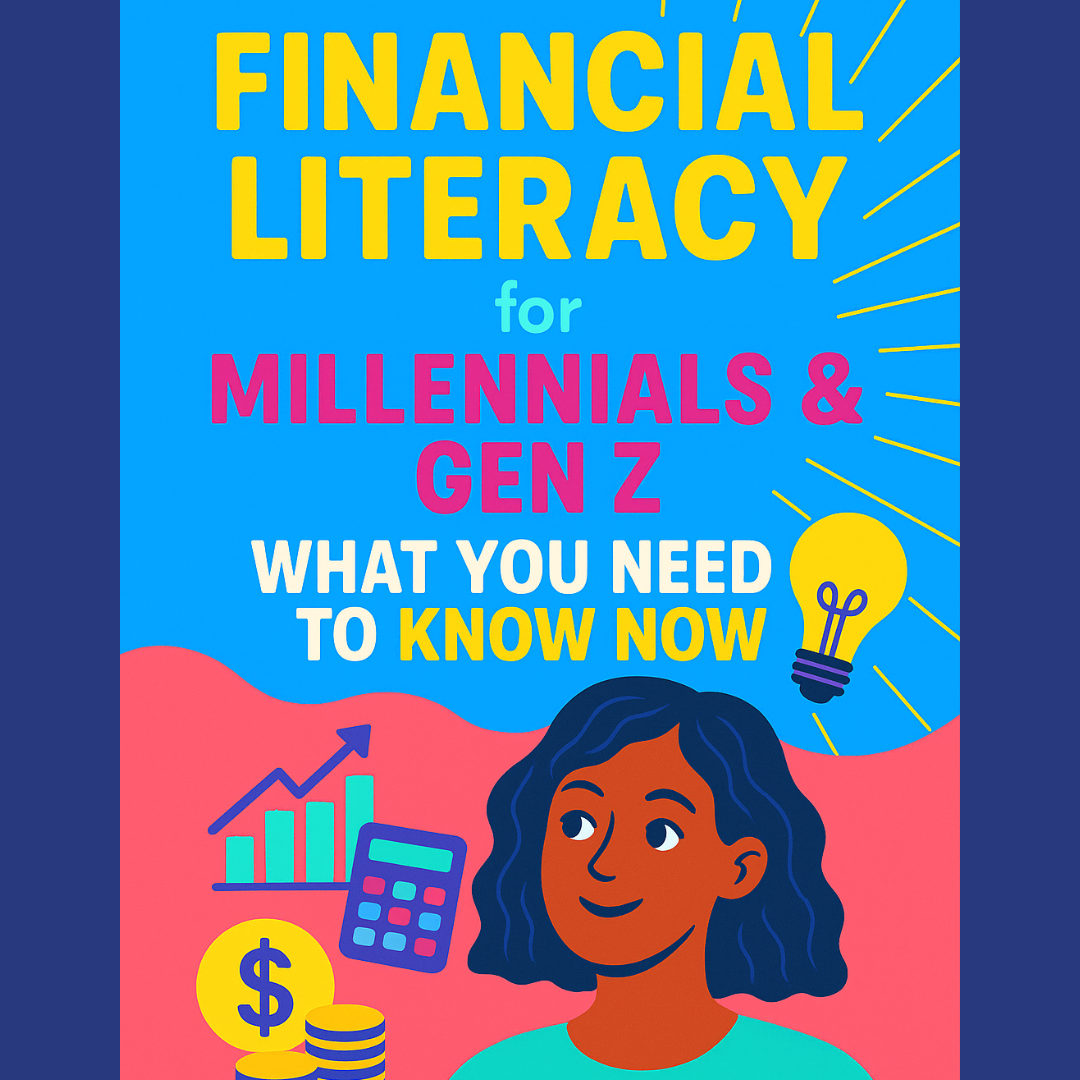Let’s get real: if you want to build wealth, you’ve got to start by challenging what you think you know about money. Because chances are, you’ve been fed a steady diet of money myths—outdated, limiting beliefs that are silently keeping you stuck, stressed, and broke. The truth? Wealth isn’t just about hard work; it’s about mindset, strategy, and breaking free from the lies you were taught to believe.
In 2025, we have more tools, access, and opportunities to grow our income than ever before. So why are so many still living paycheck to paycheck? It’s not just economics—it’s mental programming. This blog is your wake-up call. We’re exposing the most common money myths that are keeping you broke and showing you how to rewrite your money story for lasting financial success.
Myth #1: “Money Is the Root of All Evil”
Let’s start with one of the most damaging money myths out there. The original phrase is actually, “The love of money is the root of all evil,” and even that is often misunderstood. Money itself isn’t evil—it’s neutral. It’s a tool, and just like any tool, it reflects the values of the person who holds it.
Believing money is evil creates subconscious resistance. You’ll self-sabotage. You’ll repel wealth instead of attracting it. The truth? Money in the hands of good people does incredible good—it feeds families, funds nonprofits, builds communities, and creates freedom. You don’t have to choose between being a good person and being wealthy. You can be both.
Myth #2: “You Have to Work Hard to Be Rich”
Hard work has its place, but let’s get something straight: hard work alone doesn’t make you rich—smart work does. If labor equaled wealth, the hardest-working people in the world would be billionaires. The reality? Wealth comes from leveraging time, skills, systems, and strategy.
In 2025, we’re seeing people build online businesses, digital products, and passive income streams from a laptop and a Wi-Fi connection. If you’re still trading hours for dollars with no plan to scale, you’re operating under a broken model. The new money mindset is about leverage—not hustle till burnout.
Myth #3: “I’m Just Not Good with Money”
This one’s personal. So many people have bought into the identity that they’re “bad with money,” as if it’s a fixed trait. It’s not. Managing money is a learned skill, just like riding a bike or learning to cook. If no one taught you growing up, that’s not your fault—but it is your responsibility to learn now.
The tools are out there. Free YouTube tutorials. Budgeting apps like YNAB or Rocket Money. Personal finance books. Coaching programs. You have to stop declaring that you’re bad with money and start deciding that you’re becoming excellent at managing and growing it. Identity shapes behavior.
Myth #4: “You Need Money to Make Money”
This is one of the most outdated myths keeping people from even starting. The truth? While capital can accelerate your growth, resourcefulness beats resources every time. Some of the most successful entrepreneurs in the world started with nothing but an idea, Wi-Fi, and sheer determination.
In 2025, you can start a service-based business, launch a digital product, build a social media brand, or freelance your way to six figures—with zero upfront investment. What you really need is clarity, confidence, and commitment. Money follows value. Focus on delivering results, and the money will follow.
Myth #5: “Debt Is Always Bad”
Let’s bust this myth wide open. Not all debt is created equal. Consumer debt, like high-interest credit cards, can be toxic if unmanaged. But strategic debt—used to invest in income-producing assets like real estate, business development, or education—can be a powerful wealth-building tool.
The wealthy use good debt to grow their portfolios and create more cash flow. They don’t fear debt—they manage it wisely. The key is knowing the difference between bad debt that drains you and smart debt that scales you. Don’t avoid all debt out of fear. Learn to use it to your advantage.
Myth #6: “Rich People Are Just Lucky”
Let’s stop romanticizing the idea that wealth is just luck. Yes, some people are born into wealth. But the majority of today’s millionaires and entrepreneurs are self-made—people who made consistent, smart decisions over time, took risks, and stayed committed when others gave up.
Calling wealth “luck” dismisses the effort, mindset, and sacrifices that go into it. It also keeps you passive, waiting for a windfall that never comes. You don’t need a lottery win—you need a plan. You need skills, strategy, and belief in your ability to create change. You are not excluded from success.
Myth #7: “Saving Is Enough to Build Wealth”
Saving money is smart—but saving alone won’t make you wealthy. In today’s economy, where inflation is real and prices keep rising, you can’t save your way to freedom. What you save today loses value tomorrow unless you put it to work.
True wealth is built through investing, whether that’s in the stock market, real estate, a business, or your own personal development. You need to move from a “scarcity” mindset (how do I save more?) to a “growth” mindset (how do I make more and multiply it?). Saving is step one. Investing is step two.
Myth #8: “If I Make More, My Money Problems Will Disappear”
This one is sneaky. People believe that making more money will fix everything. But if you don’t master your mindset and money management, more income just means more expensive problems. You’ll earn more—and still feel broke.
You’ve probably seen it: people get raises and bonuses, then upgrade their lifestyle to match. It’s called lifestyle inflation, and it’s one of the fastest ways to stay stuck financially. You don’t need to wait until you’re rich to get smart with your money. You need to build those habits before the big money comes.
Myth #9: “Talking About Money Is Tacky”
Let’s end this with a truth bomb: silence around money is a trap. When people don’t talk about money, they stay confused, ashamed, and uninformed. That’s exactly what keeps people stuck in the cycle of survival. Wealthy people talk about money openly—strategies, investments, taxes, legacy.
If you’re not talking about money, you’re not growing. Normalize financial conversations in your circle. Ask questions. Get advice. Share wins. Money is not taboo—it’s a tool, a topic, and a doorway to opportunity. And in 2025, financial literacy is one of the most powerful forms of self-care.
Final Thoughts: Break the Money Myths, Build Your Wealth
You don’t need to work harder, win the lottery, or wait for permission to become wealthy. You need to break the money myths that are holding you back. Start with your mindset. Upgrade your financial beliefs. Replace toxic programming with truth. Because the moment you challenge the lies, you unlock the doors to financial success.
This is your time. Stop playing small with your finances. Stop settling for survival. You were meant to thrive, lead, and build wealth that lasts for generations. And it all starts by choosing to believe something different.





